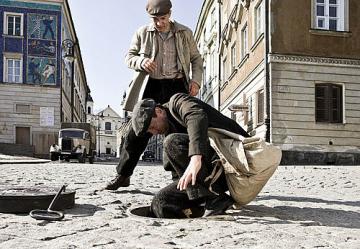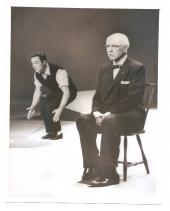'In Darkness': a harrowing subterranean tale of Nazi-occupied Poland
Anne Frank's Secret Annex in Amsterdam was luxurious compared with the Chigar family's hiding place in Lvov. Comparisons of relative degrees of horror during the Holocaust -- "Which was worse, the Dutch or Polish experience?" -- are odious but inevitable on viewing Agnieszka Holland's "In Darkness."
This ultimate upstairs/downstairs nightmare is based on the true story of Leopold Socha, a lowlife type in more ways than one: He's a sewer worker in 1943 Nazi-occupied Poland, where survival depends on bribes, extortion and theft. To supplement a meager income, he and his simple-minded pal Szczepek burglarize the homes of dispossessed Jews and stash their loot in his underground lair: the sewers beneath the Jewish ghetto.
Nobody knows that subterranean maze better than Socha, and no one could be more surprised to find it penetrated by desperate Jewish refugees from above. The Warsaw and Lvov ghettos are being systematically wiped out, their occupants killed or shipped to death camps, and the few escapees are hunted on all sides -- not just by the Germans but by Polish and Ukrainian bounty hunters.
The Nazis pay a 500-zloty reward for each refugee turned in. If local gentiles can take advantage of the Jewish liquidation and make a little cash from their misery, why not? "It's our duty," says Socha's friend Bortnik, a Ukrainian officer-collaborator.
Not everyone agrees. "Those poor people," says Socha's good wife, Wanda. "The Jews crucified Christ," says Socha. "Jesus was a Jew," she replies. Dumb Szczepek is stunned: "Is it really true -- Jesus was a Jew?"
The theological issue goes from theory to practice when the once-affluent Chigar family stumbles -- literally falls -- into Socha's rat-infested domain. The crafty Pole has two choices: Cash them in right away for the bounties, or charge them that amount for refuge there now -- with plans to extract more in the future.
He chooses the more lucrative course and calculated risk: Discovery means certain death for him as well as them. Compounding the deal, more desperate refugees show up. "I didn't promise to save every Jew in Lvov!" Socha complains.
The 10 or 12 "lucky" ones, including two children and a secretly pregnant woman, would spend the next 14 months in the underground labyrinth's unfathomable filth, stench, hunger and fear -- in preference to the even more unfathomable reality of efficient genocide going on up above.
Brilliant, original Polish director Agnieszka Holland first came to world attention with "Europa, Europa" (1990), a less brutal kind of Holocaust film -- likewise based on a true story -- in which a Jewish boy posing as a German orphan becomes a celebrated Hitler Youth member. Her subsequent films, including the beautiful "Olivier, Olivier" (1992), "The Secret Garden" (1993) and "Washington Square" (1997), have been consistently powerful and exquisitely crafted.
"In Darkness," based on Robert Marshall's book "In the Sewers of Lvov," was scripted by David Shamoon in English. But Ms. Holland insisted it be made in the languages of location -- Polish, German, Yiddish, Ukrainian and the working-class Balak dialect of Lvov -- to reflect the complex cultural mosaic of that tragic city, which the Poles call "Lwow" and which is now "Lviv" as part of Ukraine.
The resulting film, one of this year's Oscar nominees for best foreign film, is harrowing from start to finish. Graphic depictions of atrocities -- sadistic shootings and humiliations in the streets -- are mercifully few, but the slaughter goes on (whether we see it or not) to the tune of German military band music. A sudden rainstorm can literally turn the refugees into drowned rats: Their haven is a potential death trap at any moment.
Ms. Holland uses "Dido's Lament" by Purcell, with its wrenching "Remember me!" refrain, for the film's emotional peak. Her cinematography alternates a claustrophobic, hand-held camera with sophisticated dolly shots that move from below to above ground in seamless movement. The darkness is a metaphor for the Holocaust itself -- the individual and collective human capacity for hypocrisy, cruelty, depravity. Yet somehow there is hope, love and even sex in this dark hell, and Ms. Holland demands that we descend there, too, and see its condemned souls as real men and women -- not idealized victims -- with flawed characters and class conflicts in an insane situation that brings out the best and worst of human nature.
So many excruciating Holocaust films ... why another?
"Because the main mystery hasn't yet been solved," says Ms. Holland. "How was this crime possible there? Or in Rwanda or Bosnia? Where was Man during this crisis? Where was God?"
Thanks to her and to Robert Wieckiewicz's great performance, we at least know where Leopold Socha was -- a casual anti-Semitic opportunist, whose commercial enterprise gradually moved from greed to conscience. But always more human than heroic.
The slight consolation is that thousands like him did the same. The terrible truth is that millions more did not. Lvov was one of the Final Solution's most "successful" venues: Of its prewar Jewish population of 150,000, less than 1,000 survived.
Ms. Holland's dark film, which Christian educators should assign their mature students to see, reminds us that the question isn't WWJD -- "What would Jesus do?" -- it's what would you and I do, or have done?






